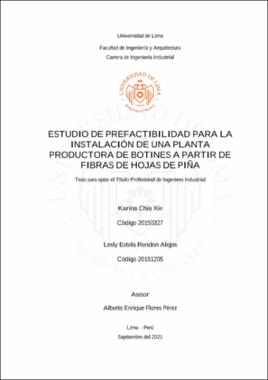Mostrar el registro sencillo del ítem
Estudio de prefactibilidad para la instalación de una planta Productora de botines a partir de fibras de hojas de piña
| dc.contributor.advisor | Flores Pérez, Alberto Enrique | |
| dc.contributor.author | Chia Xie, Karina | |
| dc.contributor.author | Rondon Alejos, Lesly Estela | |
| dc.date.accessioned | 2021-12-14T12:04:40Z | |
| dc.date.available | 2021-12-14T12:04:40Z | |
| dc.date.issued | 2021 | |
| dc.identifier.citation | Chia Xie, K. y Rondon Alejos, L. E. (2021). Estudio de prefactibilidad para la instalación de una planta productora de botines a partir de fibras de hojas de piña [Tesis para optar el Título Profesional de Ingeniero Industrial, Universidad de Lima]. Repositorio institucional de la Universidad de Lima. https://hdl.handle.net/20.500.12724/14720 | es_PE |
| dc.identifier.uri | https://hdl.handle.net/20.500.12724/14720 | |
| dc.description.abstract | El presente estudio tiene como fin evaluar la viabilidad técnica, económica y de mercado para la instalación de una planta productora de botines a base de cuero de piña que satisfaga al mercado nacional. El producto busca ser considerado como una nueva opción de calzado de cuero para reducir el impacto que tienen las fábricas productoras de cuero de origen animal con el medio ambiente. El uso de los botines de cuero se realiza mayormente en la estación de invierno y otoño este brinda comodidad para el uso diario, protegiendo a los pies hasta la altura del tobillo abarcando las tallas entre el rango de 34 - 42 con modelos en colores negro, marrón y gris para mujeres. El mercado objetivo será Lima Metropolitana, específicamente destinado para mujeres entre los NSE A, B y C, que se encuentren entre los 16 y 55 años de edad. El producto se comercializará principalmente en tiendas retail, ferias ecológicas y en la página web. La presentación es de un par de botines dentro de una caja de cartón, y será vendida a un precio de S/. 158.00. La planta se ubicará en el departamento de Junín, en la provincia de Chanchamayo y contará con una capacidad anual de producción máxima de 157,594 pares al año. El proceso de producción implicará limpieza, desfibrado, desgomado, tejido, corte, coser, foliado, montado y empacar. El área total del área de producción será de 241m². La inversión total será de S/. 1,354,551, conformada por un financiamiento bancario de 40% y un aporte propio de 60% de la inversión; obteniendo finalmente un VAN económico y financiero de S/. 1,110,835 y S/. 1,352,547 respectivamente y una TIR de 38.61% y 48.33% respectivamente. | es_PE |
| dc.description.abstract | The purpose of this study is to evaluate the technical, economic and market feasibility for the installation of a pineapple leather-based ankle boots production plant that satisfies the national market. The product seeks to be considered as a new option for leather footwear to reduce the impact that factories producing leather of animal origin have on the environment. The use of leather ankle boots is carried out mainly in the winter and autumn season, this provides comfort for daily use, protecting the feet up to the ankle height, covering sizes between the range of 34 - 42 with models in black colors, brown and gray for women. The target market will be Lima Metropolitana, specifically for women between NSE A, B and C, who are between 16 and 55 years of age. The product will be marketed mainly in retail stores, ecological fairs and on the website. The presentation is of a pair of ankle boots inside a cardboard box, and will be sold at a price of S /. 158.00. The plant will be located in the department of Junín, in the province of Chanchamayo and will have a maximum annual production capacity of 157,594 pairs per year. The production process will involve cleaning, shredding, degumming, weaving, cutting, sewing, folding, assembling and packing. The total area of the production area will be 241m². The total investment will be S /. 1,354,551, with a bank financing 40% and an own contribution of 60% of the investment; finally obtaining an economic and financial NPV of S /. 1,110,835 and S /. 1,352,547 respectively and an IRR of 38.61% and 48.33% respectively. | en_EN |
| dc.format | application/pdf | |
| dc.language.iso | spa | |
| dc.publisher | Universidad de Lima | |
| dc.rights | info:eu-repo/semantics/openAccess | * |
| dc.rights.uri | https://creativecommons.org/licenses/by-nc-sa/4.0/ | * |
| dc.source | Repositorio Institucional - Ulima | |
| dc.source | Universidad de Lima | |
| dc.subject | Industria del calzado | es_PE |
| dc.subject | Piel (Vegetal) | es_PE |
| dc.subject | Piña | es_PE |
| dc.subject | Proyectos industriales | es_PE |
| dc.subject | Estudios de prefactibilidad | es_PE |
| dc.title | Estudio de prefactibilidad para la instalación de una planta Productora de botines a partir de fibras de hojas de piña | es_PE |
| dc.type | info:eu-repo/semantics/bachelorThesis | |
| thesis.degree.level | Título Profesional | |
| thesis.degree.discipline | Ingeniería Industrial | es_PE |
| thesis.degree.grantor | Universidad de Lima. Facultad de Ingeniería y Arquitectura | |
| dc.publisher.country | PE | |
| dc.type.other | Tesis | |
| thesis.degree.name | Ingeniero Industrial | |
| renati.advisor.orcid | https://orcid.org/0000-0003-0813-0662 | |
| renati.discipline | 722026 | |
| dc.identifier.isni | 121541816 | |
| renati.author.dni | 71460170 | |
| renati.author.dni | 76990223 | |
| renati.level | https://purl.org/pe-repo/renati/level#tituloProfesional | * |
| renati.advisor.dni | 9278816 | |
| renati.juror | Molina Quenaya, Shaminy Silvia | |
| renati.juror | Seminario García, Juan Carlos | |
| renati.juror | Ugarte Gomez, José Luis | |
| renati.type | https://purl.org/pe-repo/renati/type#tesis | * |
| dc.subject.ocde | https://purl.org/pe-repo/ocde/ford#2.11.04 | |
| ulima.cat | OI |
Ficheros en el ítem
Este ítem aparece en la(s) siguiente(s) colección(ones)
-
Tesis [1207]



